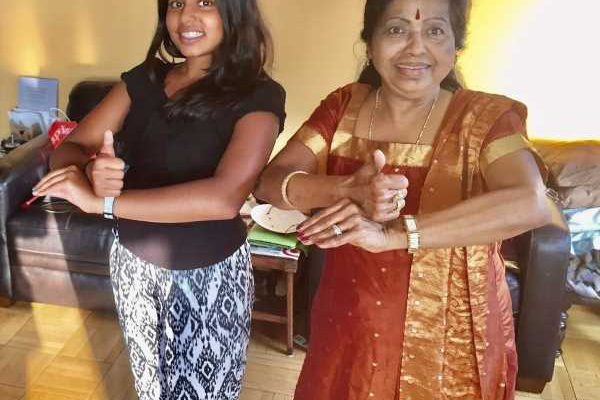‘You broke the boundary of what it meant to be an Indian woman and the wife of a diplomat.
‘You did not serve tea or sit idly by as men spoke about business matters — a trope I have seen much too often in Indian and Indian-American households.
‘You followed your dreams.’
April 19 would have been the 55th wedding anniversary of Rediff columnist T P Sreenivasan and his wife Chandralekha Sreenivasan, who died January 9, 2023.
In this essay, their granddaughter Durga Sreenivasan, 20, a student at Duke University, shares her thoughts in a letter to her grandma.
Lekha Sreenivasan’s memoirs, Better Half of Diplomacy, were published posthumously [India link; USA link].
My dearest Ammana:
I’m choking. No, it seems that I’m drowning.
As I run on the treadmill, the closing music of the grief podcast I’m listening to comes to a halt, and I can’t fight the feeling.
I know something has been taken, something beautiful. I spiral downward…
A few deep breaths bring me back to reality. Dalangu, thaka junu, thaka thari kita thom.
Those are the beginning boles that start Indian classical Bharata Natyam dance classes around the world. My guru said these words to me every dance class for seven years, and you repeated these words thousands of times as you taught dance around the world.
You knew the nine emotions within Bharata Natyam like the back of your hand; shringaaram (love), haasyam (laughter), karuna (compassion and charity), roudra (anger), veera (courage), bhayanaka (fear), bibhatsa (disgust), adbhutha (wonder), and shaantham (tranquility).
You told us relentlessly to practice haasyam, and I now practice haasyam because I know you wanted me to. The image of your face laughing is fixed in my mind.
Whenever there was any stress in your Thiruvananthapuram house, you reminded us to be present. To let go when we had to. To laugh when we can, and find time in our day to practice laughing yoga. May your face bear haasyam forever.
You were like your dance form: Boundary-breaking and steeped in ancient knowledge. To put it simply, no one leaves a Bharata Natyam classical dance class without being pushed well past their physical boundaries.
You broke the boundary of what it meant to be an Indian woman and the wife of a diplomat. You did not serve tea or sit idly by as men spoke about business matters — a trope I have seen much too often in Indian and Indian-American households. You followed your dreams.
You knew Bharatayam, and you brought its beauty to women around the world. You put your son and my dad, Sreenath, on Soviet TV in 1975 when he was just five.
You were like your artwork: Thoughtful and filled with cross-cultural knowledge. Your piece that depicts an abstracted woman of Masai origins hangs in our living room across from a painting by the legendary M F Husain. You valued the lived experiences of others and the cultures of each person you came across.
In your interactions, which I witnessed with various service workers and your own employees, I saw how much love you put into cultivating each relationship.
How you acted was seen through your charity: Whatever you did, you went all in. As you spent more than 40 years traveling the world, being a mother, and maintaining careers in dance and painting, you managed to co-found a profoundly impactful NGO, Karuna Charities, with branches in NYC, Washington DC, Nairobi and Kerala.
You paid attention to issues internationally, and thus Karuna’s funds supported folks across the world. Karuna was able to aid efforts from Texas hurricane relief funds to supporting gravely sick clients in India.
You followed your heart, and spent years building up the award-winning charity.
Your name Chandralekha means Rays of the Moon. As the moon does, your gravity pulls away the waves which my hearts aches to succumb to. The tides recede into the depths of the ocean once more.
We, your family, will miss you. We will miss you more than you know. And we will live by your values.
We will practice haasyam, and laugh until we can no more.
We will embody karuna (compassion) through charitable efforts.
And we love others empathically and without disdain.
I hope others will follow.
Your loving granddaughter, Durga
PS: To anyone reading this: Please call your loved ones and tell them you love them.
Source: Read Full Article



